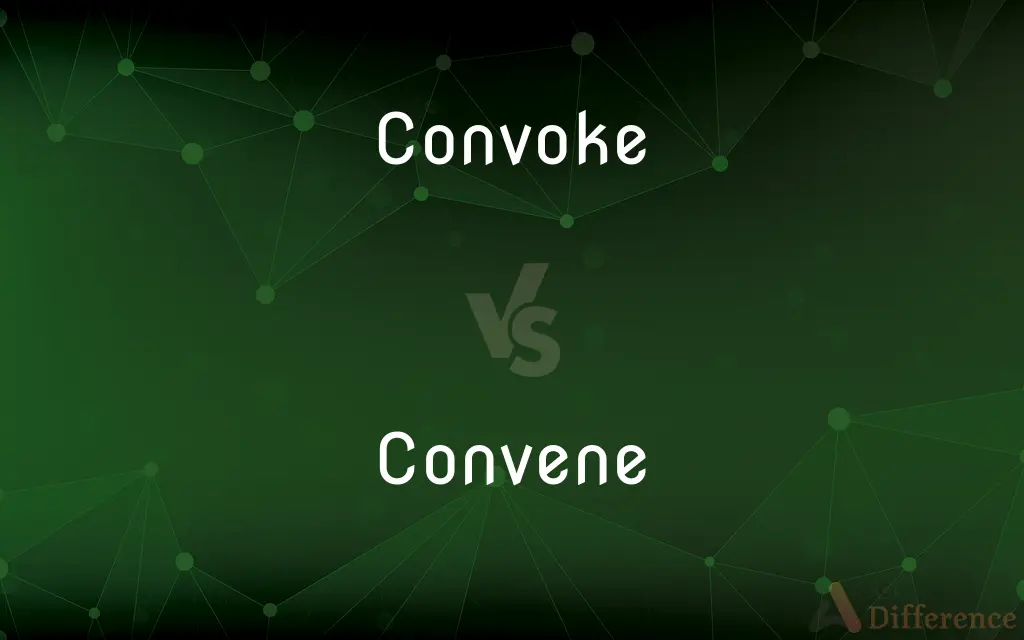Convoke vs. Convene — What's the Difference?
By Maham Liaqat & Fiza Rafique — Updated on April 2, 2024
Convoke usually implies summoning to a meeting by authority, whereas convene is more about gathering for a meeting, often voluntary.

Difference Between Convoke and Convene
Table of Contents
ADVERTISEMENT
Key Differences
Convoke often involves an authoritative or formal call to assemble, typically for specific purposes like legislative or ceremonial gatherings. For example, a government body might be convoked for a special session to address urgent matters. Convene, on the other hand, suggests a more general act of coming together or gathering for meetings or assemblies, not necessarily initiated by an authoritative figure. It can be used in a wide range of contexts, from formal meetings to casual get-togethers.
The term convoke is often used in more formal or solemn contexts, highlighting the gravity or significance of the assembly. It implies a level of solemnity or formality in the gathering, underscoring the importance of the occasion or the authority behind the summons. Whereas convene can apply to both formal and informal gatherings and doesn’t inherently carry the same weight of authority or solemnity. It is versatile, applicable to various types of meetings, whether they are of a professional, academic, or social nature.
Convoke typically involves a narrower scope, with the gatherings it refers to often being predetermined by specific roles, responsibilities, or ceremonial duties of the participants. It denotes a specific purpose or agenda behind the assembly, suggesting that the gathering is not just for discussion but for decisive action or ceremonial observance. Conversely, convene is more inclusive and broader in scope, indicating the act of gathering without specifying the nature or purpose of the meeting. This makes convene a more commonly used term in everyday language, applicable to a wide array of scenarios ranging from formal conferences to casual meet-ups.
Comparison Chart
Definition
To summon or call together by authority
To come together or assemble, often voluntarily
Formality
More formal and authoritative
Can be formal or informal
ADVERTISEMENT
Authority
Implies an official or authoritative summoning
Does not imply a specific authority calling the gathering
Context of Use
Often used in legislative, ceremonial contexts
Broadly used in various contexts
Scope
Narrower, with a specific purpose
Broader, more inclusive
Compare with Definitions
Convoke
To summon for a formal meeting.
The king convoked the royal council to discuss the matter.
Convene
To meet for a purpose.
The board convened to review the quarterly results.
Convoke
To call together for a specific purpose.
The organization convoked a panel of experts for the seminar.
Convene
To assemble informally.
Friends convened at the local café for a catch-up.
Convoke
To gather by authority.
The governor convoked an emergency session of the legislature.
Convene
To come together voluntarily.
Volunteers convened to plan the charity event.
Convoke
To mobilize officially.
The council was convoked to vote on the new policy.
Convene
To hold a gathering.
The conference convened leading experts in the field.
Convoke
To assemble for ceremonial reasons.
The committee was convoked for the award ceremony.
Convene
To gather for a meeting.
The team convened to brainstorm ideas.
Convoke
To cause to assemble in a meeting; convene.
Convene
Come or bring together for a meeting or activity; assemble
The committee had convened for its final plenary session
He had convened a secret meeting of military personnel
Convoke
(transitive) To convene, to cause to assemble for a meeting.
Convene
To come together usually for an official or public purpose; assemble formally.
Convoke
To call together.
Convene
To cause to come together formally; convoke
Convene a special session of Congress.
Convoke
To call together; to summon to meet; to assemble by summons.
There remained no resource but the dreadful one of convoking a parliament.
Convene
To summon to appear, as before a tribunal.
Convoke
Call together;
The students were convened in the auditorium
Convene
(intransitive) To come together; to meet; to unite.
Convene
(intransitive) To come together, as in one body or for a public purpose; to meet; to assemble.
Convene
(transitive) To cause to assemble; to call together; to convoke.
Convene
(transitive) To summon judicially to meet or appear.
Convene
To make a convention; to declare a rule by convention.
To forestall any problems, we convened on the rule that all the database records would avoid containing certain literal strings.
Convene
To come together; to meet; to unite.
In shortsighted men . . . the rays converge and convene in the eyes before they come at the bottom.
Convene
To come together, as in one body or for a public purpose; to meet; to assemble.
The Parliament of Scotland now convened.
Faint, underneath, the household fowls convene.
Convene
To cause to assemble; to call together; to convoke.
And now the almighty father of the godsConvenes a council in the blest abodes.
Convene
To summon judicially to meet or appear.
By the papal canon law, clerks . . . can not be convened before any but an ecclesiastical judge.
Convene
Meet formally;
The council convened last week
Convene
Call together;
The students were convened in the auditorium
Common Curiosities
Is convene applicable to formal meetings?
Yes, convene can be used for both formal and informal meetings.
What does convoke mean?
Convoke means to call together or summon to a meeting, typically by authority for a specific purpose.
What does convene mean?
Convene means to come together or assemble for a meeting or gathering, often voluntarily.
Do both terms imply a specific purpose for the gathering?
Convoke usually implies a specific purpose, whereas convene can be used more generally without a specific agenda.
Is convoke more formal than convene?
Yes, convoke typically carries a more formal connotation than convene.
Can convene be used for social gatherings?
Yes, convene can be used broadly, including for social gatherings.
Can convoke be used for informal gatherings?
Convoke is generally used for formal or official gatherings and less so for informal ones.
Does convoke imply authority?
Yes, convoke usually implies an authoritative call to assemble.
Is convoke only used in legal or governmental contexts?
While often used in such contexts, convoke can apply to any formal assembly called by authority.
Can anyone convene a meeting?
Yes, convening a meeting does not necessarily require authority; it can be done by anyone.
Does convoke require a follow-up action?
Often, yes. Convoking usually implies that the assembled group will take some form of action or make decisions.
Can a regular meeting be convoked?
While possible, regular or routine meetings are more commonly referred to as convened, unless they are formally called by authority.
Can convene be used in legal documents?
Yes, convene can be used in legal documents, especially when referring to the assembly of groups or meetings.
Are there synonyms for convoke and convene?
Yes, "summon" or "call together" for convoke and "gather" or "assemble" for convene are synonyms.
Can organizations convene?
Yes, organizations can convene meetings, workshops, and conferences.
Share Your Discovery

Previous Comparison
Subplot vs. Plot
Next Comparison
Fury vs. LividAuthor Spotlight
Written by
Maham LiaqatCo-written by
Fiza RafiqueFiza Rafique is a skilled content writer at AskDifference.com, where she meticulously refines and enhances written pieces. Drawing from her vast editorial expertise, Fiza ensures clarity, accuracy, and precision in every article. Passionate about language, she continually seeks to elevate the quality of content for readers worldwide.















































